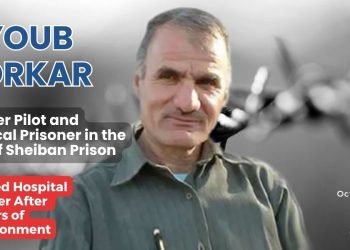As the systematic repression and pressure against political prisoners in the Islamic Republic of Iran intensify, personal and human stories from inside the prisons continue to reveal bitter yet inspiring realities. One such story is that of veteran political prisoner Saeed Masouri, whose forced transfer and exile have recently been attempted by Iranian security forces—an effort temporarily thwarted by his fellow inmates’ resistance.
A Letter from a Former Cellmate: Arash Sadeghi’s Account
Arash Sadeghi, a civil rights activist and former political prisoner, has published an emotional and well-documented account of his years spent in the same prison ward with Saeed Masouri. He writes:
“I was 13 or 14 years old when I first heard Saeed Masouri’s name… I never imagined that one day I’d share a cell with him. Four and a half years after my exile in 2017, I lived alongside him. Two decades of imprisonment, solitary confinement, torture, transfers, exile… none of it has managed to break his spirit.”
Sadeghi also highlights the plight of Masouri’s elderly and ill mother, shedding light on another dimension of systemic cruelty. A mother who, due to memory loss, only remembers the day of her visit with her son—and now, after 25 years of waiting, is no longer able to travel to visit him in Khorramabad prison.
From Medical Studies in Europe to Life Imprisonment in Iran
Saeed Masouri, born in 1965 in Khorramabad, was arrested in January 2001 upon entering Iran. Before his arrest, he was pursuing medical studies in Germany and Norway. His official charge was “collaboration with the People’s Mojahedin Organization of Iran (PMOI)”, a charge that led to severe torture during interrogations at the Ahvaz Intelligence Office and in Evin Prison’s Ward 209.
In 2002, the Tehran Revolutionary Court sentenced him to death, a verdict later reduced to life imprisonment. However, in over 25 years of incarceration, Masouri has not been granted a single day of furlough. He has been held in Evin, Gohardasht (Rajaei Shahr), and Qezel Hesar prisons, facing repeated threats, beatings, exile, and severe restrictions.
Forced Transfer and Exile: A Continuation of Systematic Pressure
In the most recent example of these pressures, on July 16, 2025, special guards at Qezel Hesar Prison entered the ward with a premeditated plan to forcibly transfer Masouri to an unknown location. This action—seemingly aimed at psychological pressure or exile—was met with collective protest by the political prisoners and was temporarily blocked.
Following this incident, Masouri wrote a warning letter titled “A Crime in Progress” addressed to the international community, in which he warned of escalating repression against political prisoners and declared that his life and those of others were in imminent danger.
Ongoing Human Rights Violations: More Than Just One Prisoner
Saeed Masouri’s case is only one among hundreds of documented human rights violations against political prisoners in Iran. What sets his story apart, however, is his extraordinary resilience in the face of 25 years of imprisonment without furlough, alongside the denial of basic rights such as medical treatment, phone calls, education, and family visits.
Arash Sadeghi concludes his letter by emphasizing that these repressive actions are not limited to the prisoners themselves—they also target their families. Sudden exiles, forced transfers, and neglect of elderly parents are part of a broader psychological warfare strategy aimed at breaking the spirit of political and social activists behind bars.







